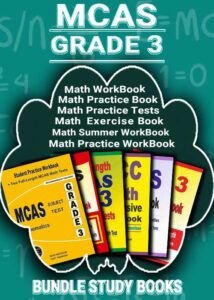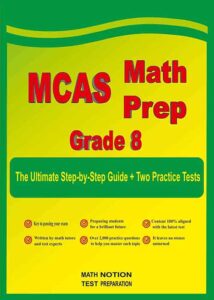
Study Time: 5minutes
Understanding MCAS Math Scoring: A Comprehensive Guide
Overview of the MCAS Math
Understanding how the MCAS Math is scored is crucial for educators, students, and parents to interpret the results accurately and make informed decisions regarding academic progress and instructional strategies. The Massachusetts Comprehensive Assessment System (MCAS) is a standardized testing program designed to assess students’ proficiency in various subjects, including mathematics. This article provides a detailed overview of the MCAS math scoring process, performance levels, and implications for students in Massachusetts.
The MCAS math tests students’ understanding of mathematical concepts and ability to apply them to solve problems. Administered annually, the MCAS is essential for measuring academic achievement and guiding educational improvements. The scoring process involves multiple steps and considers multiple-choice and open-response questions, ensuring a comprehensive evaluation of students’ mathematical abilities.
Test Structure
The MCAS math typically includes a variety of question types, such as multiple-choice, short-answer, and open-response questions. These questions cover various mathematical topics, including arithmetic, algebra, geometry, and data analysis. The test assesses procedural skills and conceptual understanding, providing a balanced measure of students’ mathematical knowledge.
Administration
The MCAS Math is administered to students in grades 3-8 and grade 10. The specific content and complexity of the test vary by grade level, aligning with the Massachusetts Curriculum Frameworks. The tests are typically conducted in the spring, with results released later in the year.
Scoring Process
Multiple-Choice Questions
Multiple-choice questions on the Math MCAS are scored electronically. Each correct answer earns the student one point, while incorrect answers receive no points. There is no penalty for guessing, encouraging students to attempt every question. The total score for multiple-choice questions is the sum of all correct responses.
Open-Response and Short-Answer Questions
Open-response and short-answer questions are scored by trained evaluators using a rubric. The rubric provides specific criteria for assigning points based on the accuracy, completeness, and clarity of the student’s response. Open-response questions are typically scored on a scale from 0 to 4 points, while short-answer questions may be scored on a scale from 0 to 2 points.
Raw Scores and Scaled Scores
The raw score for the Math MCAS is the sum of points earned from all multiple-choice, short-answer, and open-response questions. This raw score is then converted into a scaled score to account for variations in test difficulty across different administrations. The scaled score provides a standardized measure of student performance, allowing for comparisons over time and across different groups of students.
Performance Levels
Four Performance Levels
The Math MCAS results are reported in four performance levels: Exceeding Expectations, Meeting Expectations, Partially Meeting Expectations, and Not Meeting Expectations. Each level reflects a range of scaled scores and provides a general indication of the student’s proficiency in mathematics.
- Exceeding Expectations: Students at this level demonstrate advanced understanding and application of mathematical concepts, exceeding the grade-level expectations.
- Meeting Expectations: Students at this level demonstrate a solid understanding and application of mathematical concepts, meeting the grade-level expectations.
- Partially Meeting Expectations: Students at this level demonstrate a partial understanding and application of mathematical concepts, approaching but not fully meeting the grade-level expectations.
- Not Meeting Expectations: Students at this level demonstrate minimal understanding and application of mathematical concepts, significantly below the grade-level expectations.
Implications of Performance Levels
Performance levels provide valuable information about a student’s strengths and areas for improvement. They guide instructional planning, helping educators tailor their teaching strategies to address individual and group needs. High-performance levels indicate readiness for more advanced coursework, while lower levels may signal the need for additional support and intervention.
Using MCAS Scores for Educational Improvement
Individual Student Progress
MCAS scores offer insights into individual student progress, highlighting areas of proficiency and areas that require further development. Educators can use these scores to set personalized learning goals and implement targeted interventions, ensuring each student receives the support needed to succeed.
School and District Accountability
MCAS scores are also used to evaluate school and district performance. Aggregate scores measure overall effectiveness, informing decisions about resource allocation, professional development, and curriculum adjustments. Schools and districts with consistently high scores are recognized for their success, while those with lower scores may receive additional support and resources to improve student outcomes.
Statewide Trends and Policy Decisions
At the state level, MCAS scores help identify trends in student achievement and inform educational policy decisions. Policymakers use this data to assess the impact of educational initiatives, allocate funding, and develop strategies to close achievement gaps. The goal is to ensure that all students in Massachusetts have access to high-quality education and the opportunity to reach their full potential.
FAQs
How are multiple-choice questions scored on the MCAS Math?
Multiple-choice questions are scored electronically, with each correct answer earning one point. Incorrect answers receive no points, and there is no penalty for guessing.
What are the four performance levels on the MCAS Math?
The four performance levels are Exceeding Expectations, Meeting Expectations, Partially Meeting Expectations, and Not Meeting Expectations. Each level reflects a range of scaled scores and indicates the student’s proficiency in mathematics.
How are open-response questions evaluated on the MCAS Math?
Open-response questions are scored by trained evaluators using a rubric. The rubric provides specific criteria for assigning points based on the response’s accuracy, completeness, and clarity.
Why are raw scores converted to scaled scores on the MCAS Math?
Raw scores are converted to scaled scores to account for variations in test difficulty across different administrations. Scaled scores provide a standardized measure of performance, allowing for fair comparisons over time and across different groups of students.
How can educators use MCAS Math scores to improve instruction?
Educators can use Math MCAS scores to identify individual student strengths and areas for improvement. This information helps set personalized learning goals, implement targeted interventions, and tailor instructional strategies to meet student needs.
What role do MCAS scores play in school and district accountability?
MCAS scores are used to evaluate school and district performance. Aggregate scores measure overall effectiveness, informing decisions about resource allocation, professional development, and curriculum adjustments to improve student outcomes.
The MCAS Math scoring process is designed to provide a comprehensive and accurate assessment of student proficiency in mathematics. Understanding how these scores are calculated and interpreted is essential for educators, students, and parents. Using MCAS scores to guide instructional decisions and policy-making, stakeholders can work together to enhance educational outcomes and ensure all students achieve their full potential.



